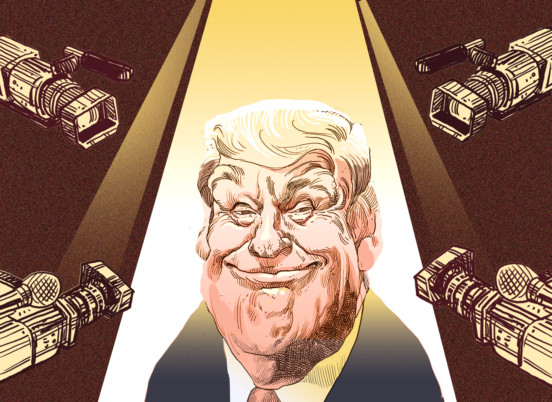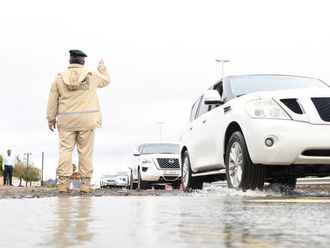
Many Americans are watching in surprise as Donald Trump appears increasingly likely to be the Republican presidential nominee. Only a few months ago, many commentators, including me, thought it unlikely given his shocking statements about women, Muslims, Mexicans, African Americans and more. How did this happen?
One explanation is that the media in the United States gave Trump too much attention earlier in the campaign, pushing aside less sensationalist moderate candidates and inuring the American public to Trump’s extreme views. With Trump now vowing to change libel laws so that it is much easier to sue media outlets that criticise him, some now suggest that the media may suffer for its role in promoting him, if he becomes president.
Certainly, the broadcast media gave far more airtime to Trump than to any other candidate. While this may seem reasonable now that he is the leading Republican candidate, it was less justifiable earlier in the campaign. According to the widely cited Tyndall Report, the weekday nightly newscasts of the three major broadcast networks (ABC, NBC, CBS) devoted 327 minutes of coverage to Trump alone in 2015, compared to 123 minutes to the Republican candidate debates and 121 minutes to Democrat hopeful Hillary Clinton’s campaign. Reliable statistics are harder to find for cable news networks (primarily Fox News, CNN and MSNBC), but an analysis by the left-of-center Media Matters organisation found that Fox News gave Trump twice as much airtime in 2015 as any other Republican candidate. Some analysts — and Trump himself — have said that the media essentially provided him with free advertising.
This was the natural outcome of changes in the fundamental nature of today’s media landscape in the US. American media has always been a business, focused on earning profit through advertising and subscriptions. Additionally, in the last 15-20 years, US media evolved in a way that set the stage for someone like Trump.
Several trends have changed the way media in the US works. One is the explosion in media options, including the creation of cable TV and the internet. This increased competition drove many traditional news outlets to cut reporting budgets and allowed consumers to focus only on media that reinforced previously held beliefs. A major part of this story was the launch of Fox News in 1996, expressly created in opposition to what its founders and fans consider the “liberal” (left-of-centre) mainstream media. Fox is a channel for the political right, with little attempt to bring in other perspectives. It created an echo chamber in which conservatives only heard from other conservatives.
Fox also took the idea of “infotainment” — entertainment centred around current issues — to a new level. Most of Fox’s airtime is devoted to political talk shows, with only a relatively small amount devoted to news reporting. Similar to reality TV, which became popular around the same time, Fox is all about drama. The formula proved to be a winner and was soon copied by others, including MSNBC and CNN. Dramatic stories! Dramatic music, camera angles, visuals and lighting! Hosts dressed more for a Hollywood event than for sober news reporting and analysis!
The changes in the media landscape created an opening for someone to appeal to voters on the basis of his entertainment value and the fantasies he offers rather than on the basis of policies and experience in government. Trump — the veteran reality-TV star of The Apprentice — walked right through that opening and onto the stage.
The businesspeople behind the media companies know that someone as entertaining and intentionally controversial as Trump means high ratings for broadcast media and lots of clicks for internet media. Advertising is essential to media in the US. Looking at articles about Trump, one constantly comes across many advertisements and lots of click bait. Even those who are critical of Trump still benefit financially if people watch their shows or click on their articles/videos because of Trump. CBS Chairman and CEO Les Moonves reportedly said regarding Trump’s candidacy, “It may not be good for America, but it’s damn good for CBS”.
Once Trump was in the media spotlight, he was able to draw on the partisan nature of political news reporting. In the conservative echo chamber of Fox News, his extreme ideas appeared less extreme, especially as they were repeated over and over. As he gained in the polls and eventually the nomination process, media increasingly had to cover him, creating a feedback loop that raised his profile even higher.
His controversial statements created a bind for his critics. For those who oppose his extreme statements about torture, Muslims, women and more, how could they remain silent? And, yet, by speaking out, they were giving him more attention, feeding into a cycle that buoys his candidacy.
Modern media created the stage for Trump and allowed him to grab the spotlight. But others also bear responsibility. As voters and consumers of media, Americans have choices. Fox News would have fizzled as a network if there were not millions of people who want to watch it; instead, it has been the #1 cable news channel for years. Trump’s candidacy would have collapsed without voters. The reality is that Trump appeals to many Americans, for many reasons. In the end, American voters, not the media, will decide if he becomes president.
Kerry Boyd Anderson is a writer and political risk consultant.










